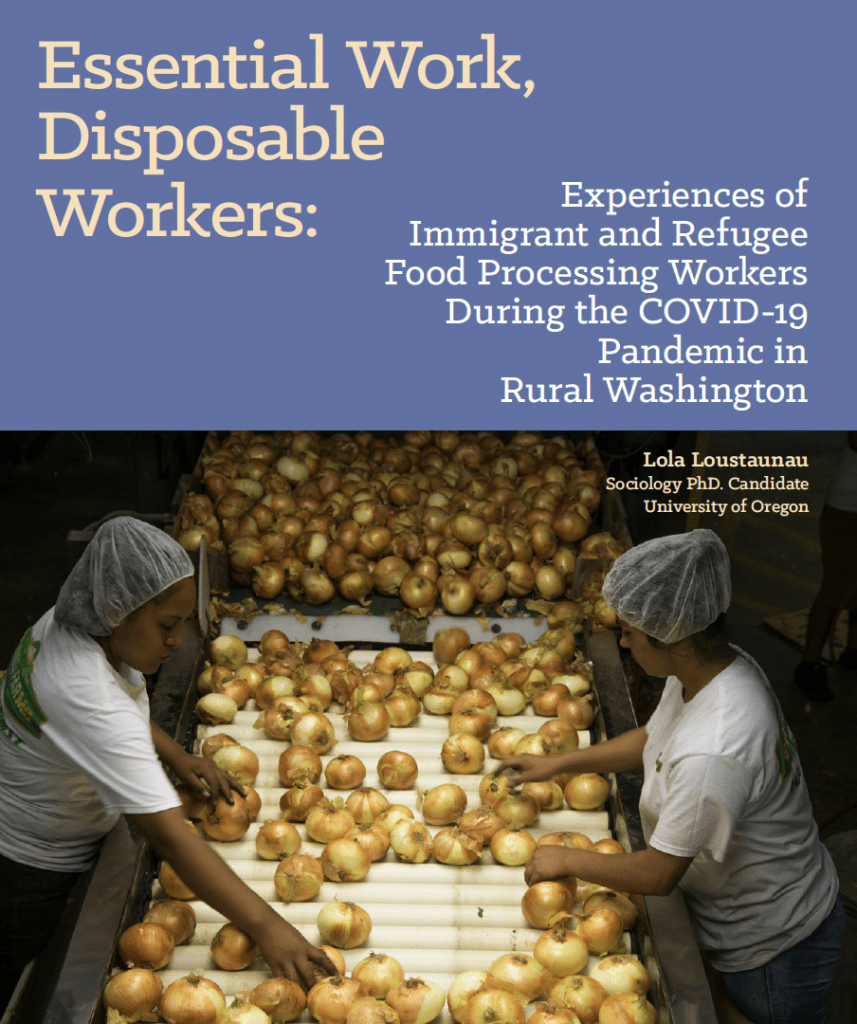Experiences of Immigrant and Refugee Food Processing Workers During the COVID-19 Pandemic in Rural Washington
A research report by Lola Loustaunau, Sociology Doctoral Candidate, University of Oregon
 In the past several months, food processing workers have made the headlines of newspapers across the U.S. and the world. Usually invisibilized, these workers came under the spotlight due to their suddenly salient precariousness and importance. Food processing plants, where the majority of workers are immigrants and workers of color and where production entails long shifts in crowded closed environments, become sites of some of the largest COVID-19 outbreaks. The high incidence of cases of COVID-19 in the industry renewed conversations about the working conditions and the overall sustainability of the U.S. food supply chain. Based on 40 in-depth interviews with immigrant and refugee workers and labor and community organizers living and working in an area of rural Washington with a high concentration of food processing plants, an analysis of publicly available information for agencies and news-media, this new report seeks to illuminate the main challenges faced by these workers both at their workplace and as they tried to access public relief.
In the past several months, food processing workers have made the headlines of newspapers across the U.S. and the world. Usually invisibilized, these workers came under the spotlight due to their suddenly salient precariousness and importance. Food processing plants, where the majority of workers are immigrants and workers of color and where production entails long shifts in crowded closed environments, become sites of some of the largest COVID-19 outbreaks. The high incidence of cases of COVID-19 in the industry renewed conversations about the working conditions and the overall sustainability of the U.S. food supply chain. Based on 40 in-depth interviews with immigrant and refugee workers and labor and community organizers living and working in an area of rural Washington with a high concentration of food processing plants, an analysis of publicly available information for agencies and news-media, this new report seeks to illuminate the main challenges faced by these workers both at their workplace and as they tried to access public relief.
Using the Center for Disease Control’s safety recommendations for the food processing industry as a guideline, the report examines these underrepresented workers’ experiences with the regulations implemented to ensure their safety. Overall, workers expressed that companies were slow to implement the recommended changes,even as more and more cases of COVID-19 infections amongst food processing workers were reported. According to workers, some recommended measures were never implemented at their workplaces and even as companies partially followed the recommendations,workers discussed the practical limitations encountered and the impacts on their safety. Shifting governmental guidelines and a lack of mandatory regulations to protect these workers contributed to extensive variation in company responses and increased health risks. The report also found that the majority of the workers struggled to access benefits or economic support. Workers and advocates described facing contradictory or inaccurate information, a fragmented and overwhelmed bureaucratic system, and language and technology barriers. Finally, workers also called attention to the medium and long term consequences for their economic stability, emotional health and family well-being and the lack of policies that addressed this. The report concludes with future policy recommendations.
